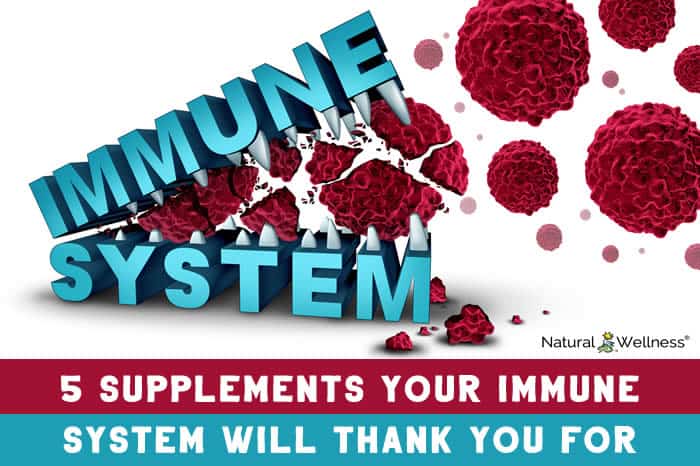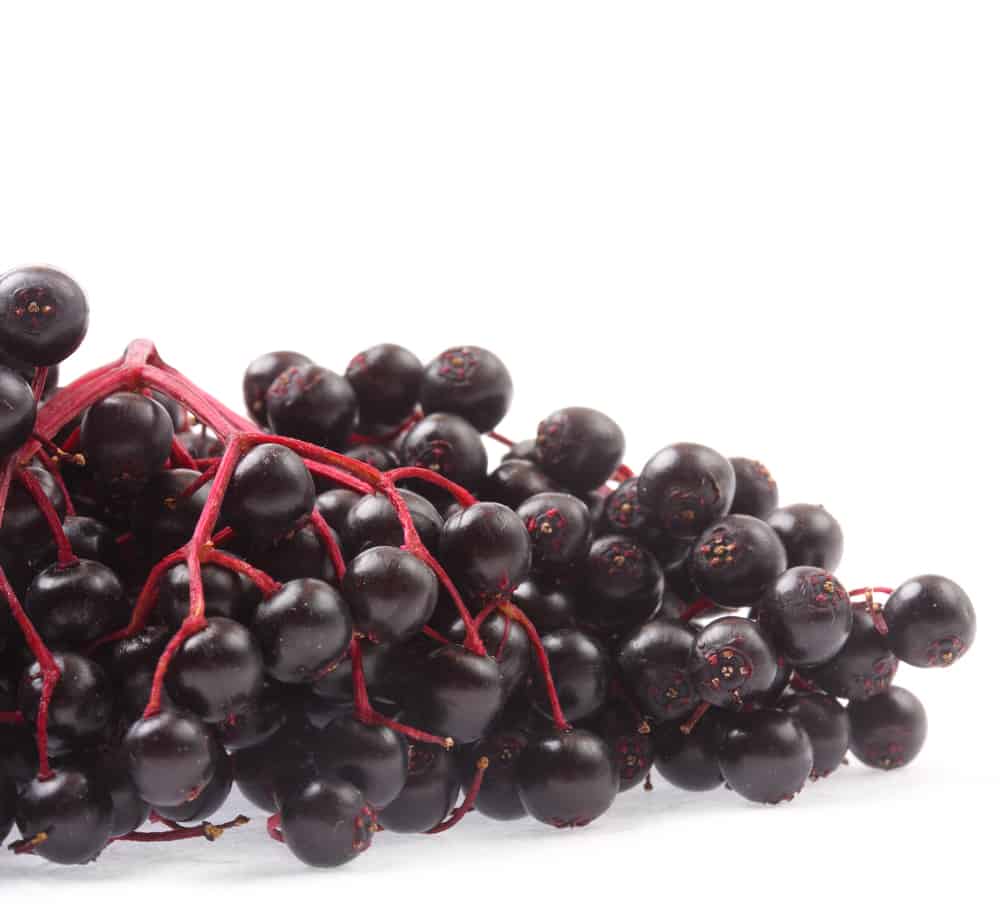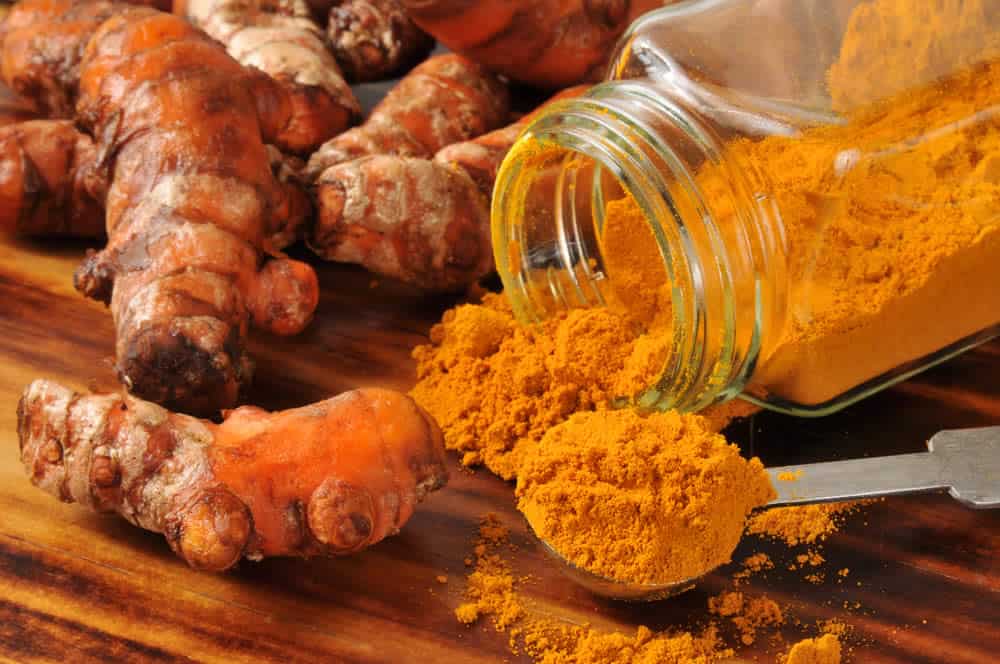

We all need a helping hand in life sometimes, and the same thing goes for our immune system. Following a healthy lifestyle gives your immune system the strength it needs to fight off germs and defend against diseases caused by microorganisms.
There are a few animal studies that show evidence that micronutrient deficiencies can alter the immune response – therefore making diet very important. (1)
Below are 5 various nutrients available in food and supplements that have been linked up with immune health.
1. Elderberries

Way back in 400 B.C. Hippocrates (AKA the “Father of Medicine”) described the elder tree as his “medicine chest” because its berries and flowers were beneficial for healing. The plant is chock full of antioxidants and vitamins that can aid with inflammation and be a helping hand to our immune system.
One study found that the polyphenols in elderberry helped to support the immune system by increasing the white blood cell count, although more research needs to be done on human participants. (2) White blood cells are essentially immunity cells; they only make up about 1% of your blood but travel around to fight viruses, bacteria, and other invaders.
Unfortunately, elderberries can be hard to find locally (and can be quite expensive) but you may be able to find fresh, frozen, or dried berries online. Supplements could be a cheaper route.
2. Probiotics
All microorganisms aren’t bad microorganisms. In fact, our body has live bacteria and yeasts that naturally live within it. If too many bad bacteria take over the good bacteria, things can get out of whack and make you sick.
Taking probiotics, like Natural Wellness’s Ultra Probiotic Formula, can boost your good bacteria to ensure everything stays balanced with its 35 billion probiotic cells. Research has shown that probiotics have the ability to stimulate the immune system by activating various immune mechanisms. (3) This can result in fewer infections. In fact, one study that found one lactobacillus strain reduced frequency and severity of respiratory infections in children by 17%. (4) Another lactobacillus strain reduced the risk of urinary tract infections in women by 50%. (5)
When looking for foods to boost your probiotic needs, make sure to check the label for “live and active cultures.”
Specific foods and drinks include: (6)
- Yogurt
- Kefir
- Kombucha
- Tempeh
- Fermented pickles or sauerkraut
3. Vitamin D
When the sun hits our skin, our body creates vitamin D. In order to get sufficient amounts of vitamin D from sunshine, you should be outdoors for about 10 to 30 minutes at midday for several days per week. The problem is that many of us protect ourselves with sunscreen which can actually block the sun’s radiation and limit the amount of vitamin D our body creates. Another problem is winter months don’t provide much sunlight, making it common to deal with a vitamin D deficiency.
Vitamin D plays a role in our immune health by activating various immune system defenses such as T cells and macrophages which protect us from pathogens. (7) Research has found that individuals with low vitamin D levels have increased risk of infection, disease, and immune-related disorders. (8)
Vitamin D is found in very few foods, but it is fortified in many.
Some foods that contain vitamin D, include: (9)
- Salmon
- Tuna fish
- Fortified orange juice
- Fortified dairy and plant milks
- Beef liver
- Egg yolk
- Fortified cereals
This is where supplementation may be helpful. Natural Wellness provides a 5,000 IU vitamin D3 supplement that you can take 1 time per day to maintain sufficient vitamin D levels.
4. Turmeric
Related to ginger, turmeric has been used in traditional Indian medical systems and in traditional Chinese medicine. It has anti-inflammatory, antiseptic, antioxidant, and antibacterial properties, making it effective in keeping the immune system in tip-top shape.
Taking a turmeric supplement is believed to help with conditions such as: (10)
- Arthritis
- Digestive disorders
- Respiratory infections
- Allergies
- Liver disease
- Depression
Curcumin and curcuminoids (which is a combination of curcumin and other similar substances) are main compounds found in turmeric that researchers believe give turmeric its health benefits.
Natural Wellness’s Turmeric 95 supplement contains 95% curcuminoids, which is the highest level available. The absorption of this supplement is 20 times higher since it’s mixed with a proprietary form of black pepper called Bioperine®. Research has found that piperine increased curcumin bioavailability by 2,000% after 45 minutes. It can also help curcumin stay in body tissues for a significantly longer time than when curcumin is taken alone. (11)
The most common way to get turmeric in your diet is by using it as a spice. Curry powder’s main ingredient is turmeric and can be used in a variety of dishes including soups, smoothies, rice, and even tea.
5. Selenium
Selenium is an essential nutrient and is made up of about 25 various selenoproteins. Some of these selenoproteins can help protect against viral infections, oxidative stress, and control hormone signaling. (12) Two specific selenoproteins – glutathione peroxidases and thioredoxin reductase – are important for antiviral defenses.
When it comes to selenium and its effect on the immune system, research has found that selenium deficiency may result in impaired innate and adaptive immune responses. It’s even been researched in having a beneficial effect on some viral infections, including hepatitis C. (13)
Natural Wellness’s Selenium is made from a clinically researched organic selenium called SelenoExcell. A 2014 study (14) found that selenium enriched yeast (specifically SelenoExcell) was more effective at reducing oxidative stress in men, especially those who had low selenium levels, compared to selenomethionine (another form of selenium).
Foods that are rich in selenium include: (14)
- Brazil nuts
- Seafood
- Organ and muscle meats
- Cereals and grains
- Dairy products
Levels of selenium found in various plant and animal foods depends on the selenium content in the soil, but it has a lesser effect on animal products since livestock tend to be given feed with sufficient selenium concentrations.





